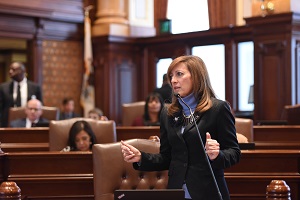
Senator Holmes votes to streamline wasteful government
- Details
- Category: New Releases
SPRINGFIELD – To make local government more efficient and ease the property tax burden on her constituents, State Sen. Linda Holmes, D-Aurora, voted in favor of SB3, a bill that grants counties the ability to cut or consolidate local units of government. Previously, only DuPage, Lake, and McHenry Counties were able to consolidate local government units in this way. This bill extends that ability to all counties in the state.
“The property owners in my district have suffered under an increasingly large property tax burden over the years,” Holmes said. “Property taxes rise for numerous reasons, but one common-sense way to control and lower them is to grant local governments the ability to consolidate and eliminate unnecessary and wasteful units.”
With over 7,000 units of local government, Illinois has more than any other state in the country. This legislation is a step toward lowering that number and streamlining government.
Having passed the Senate as part of the “grand bargain” agreement, SB3 awaits the approval of the rest of the bills in the package before moving on to the House of Representatives.
Governor signs bill to extend River Edge tax credits
- Details
- Category: Latest
Dec. 20, 2016 - The Rockford Advocate | Original article
SPRINGFIELD – Illinois Gov. Bruce Rauner, on Tuesday, signed Senate Bill 1488, legislation to extend the River Edge Redevelopment Zone Program. The program allows for an income tax credit to be awarded for the restoration and preservation of a qualified historic structure located in a River Edge Redevelopment Zone.
Senate Bill 1488 is effective immediately and extends the River Edge Redevelopment Zone Program for one year, to sunset on January 1, 2018. A River Edge Redevelopment Zone is a specific area designated by the State of Illinois in cooperation with a local government to safely revive and redevelop environmentally-challenged properties that will stimulate economic revitalization and create jobs in Illinois. River Edge Redevelopment Zones are located in Rockford, Aurora, Elgin, Peoria and East St. Louis. The program is administered at the state level by the Illinois Department of Commerce and Economic Opportunity.
“The Rivers Edge program has already helped preserve a local landmark in Aurora,” said State Sen. Linda Holmes (D-Aurora). “This program spurs economic development, repurposes historic structures, and creates jobs in the community. I am glad this important plan will be extended and know it will create even more opportunities for development.”
Rivers Edge development program extension signed into law
- Details
- Category: New Releases
 AURORA — A plan that would extend an economic development program that this year aided in the rehabilitation of the old St. Charles Hospital in Aurora will become law. Put forth by State Reps. Linda Chapa LaVia and Stephanie Kifowit and advocated in the Illinois Senate by State Sen. Linda Holmes, the legislation was signed today by Gov. Bruce Rauner.
AURORA — A plan that would extend an economic development program that this year aided in the rehabilitation of the old St. Charles Hospital in Aurora will become law. Put forth by State Reps. Linda Chapa LaVia and Stephanie Kifowit and advocated in the Illinois Senate by State Sen. Linda Holmes, the legislation was signed today by Gov. Bruce Rauner.
“The Rivers Edge program has already helped preserve a local landmark in Aurora. This program spurs economic development, repurposes historic structures, and creates jobs in the community,” said Holmes, D-Aurora. “I am glad this important plan will be extended and know it will create even more opportunities for development.”
The Rivers Edge Redevelopment Zone program designates areas in several cities throughout Illinois, including Aurora, as marked for tax credits tied to redevelopment. Developers used the program this past year as they repurposed the historic St. Charles Hospital for use as a new senior living center.
The legislation was Senate Bill 1488. It extends the sunset for the Rivers Edge program to the end of 2017.
###
Illinois will provide new wallet card for autism spectrum disorders
- Details
- Category: New Releases

“This is good legislation that will be beneficial for first responders as they engage with individuals who may have developmental disabilities such as autism,” said Kifowit, D-Aurora. “It came from a concerned parent who was able to foresee how we can avoid some of these concerns. The main goal is to reduce conflicts and bring awareness of individuals with the special needs that came with autism.”
“This is another means of using a little forethought and preparation to help people (and help the people that help people),” said Holmes, D-Aurora. “I thank the governor for signing it into law and want to remind family members of those with disorders on the autism spectrum that you, too can get a card to have handy to provide to medical personnel in an emergency.”
Illinois Secretary of State Jesse White commended Holmes and Kifowit’s efforts to raise autism awareness in a statement Monday.
“Providing these new cards to eligible drivers is a service that can help both emergency responders and law enforcement officials when they must be able to quickly assess a situation and the individuals involved,” White said. “It is my hope that by doing so we can avoid some unpleasant and unfortunate misunderstandings.”
Much like medical bracelets, the wallet cards are designed to convey crucial personal medical information to first responders and hospital personnel in situations when a person may be incapacitated or otherwise incapable of communicating to the people treating him or her. Cards will be available from the Secretary of State’s Office to drivers who have an annotated disability on their licenses.
The legislation was House Bill 4257. It becomes effective Jan. 1, 2017.
###
More Articles …
Page 71 of 83



